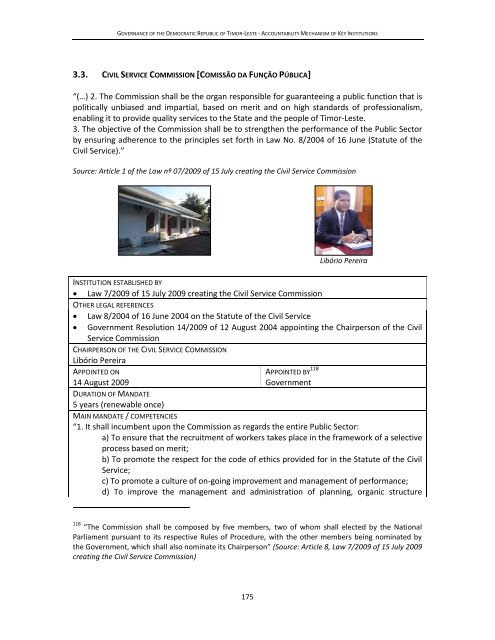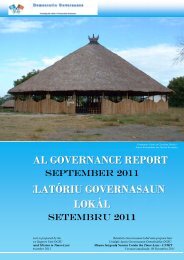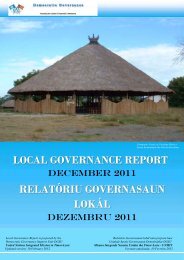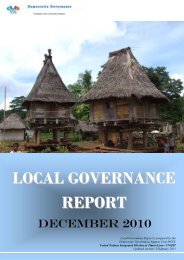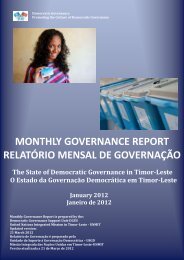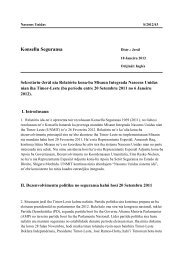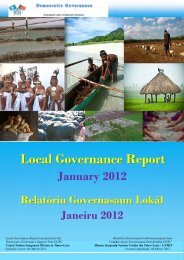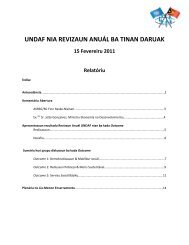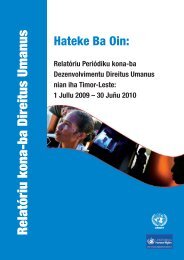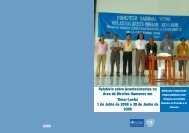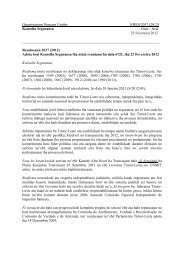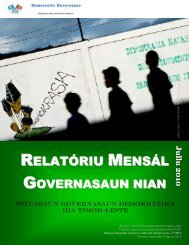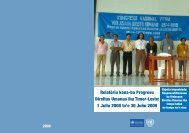Key Institutions Report final 15 December 2011 - Unmit
Key Institutions Report final 15 December 2011 - Unmit
Key Institutions Report final 15 December 2011 - Unmit
Create successful ePaper yourself
Turn your PDF publications into a flip-book with our unique Google optimized e-Paper software.
GOVERNANCE OF THE DEMOCRATIC REPUBLIC OF TIMOR-LESTE - ACCOUNTABILITY MECHANISM OF KEY INSTITUTIONS<br />
3.3. CIVIL SERVICE COMMISSION [COMISSÃO DA FUNÇÃO PÚBLICA]<br />
“(…) 2. The Commission shall be the organ responsible for guaranteeing a public function that is<br />
politically unbiased and impartial, based on merit and on high standards of professionalism,<br />
enabling it to provide quality services to the State and the people of Timor-Leste.<br />
3. The objective of the Commission shall be to strengthen the performance of the Public Sector<br />
by ensuring adherence to the principles set forth in Law No. 8/2004 of 16 June (Statute of the<br />
Civil Service).”<br />
Source: Article 1 of the Law nº 07/2009 of <strong>15</strong> July creating the Civil Service Commission<br />
INSTITUTION ESTABLISHED BY<br />
Law 7/2009 of <strong>15</strong> July 2009 creating the Civil Service Commission<br />
175<br />
Libório Pereira<br />
OTHER LEGAL REFERENCES<br />
Law 8/2004 of 16 June 2004 on the Statute of the Civil Service<br />
Government Resolution 14/2009 of 12 August 2004 appointing the Chairperson of the Civil<br />
Service Commission<br />
CHAIRPERSON OF THE CIVIL SERVICE COMMISSION<br />
Libório Pereira<br />
APPOINTED ON APPOINTED BY 118<br />
14 August 2009 Government<br />
DURATION OF MANDATE<br />
5 years (renewable once)<br />
MAIN MANDATE / COMPETENCIES<br />
“1. It shall incumbent upon the Commission as regards the entire Public Sector:<br />
a) To ensure that the recruitment of workers takes place in the framework of a selective<br />
process based on merit;<br />
b) To promote the respect for the code of ethics provided for in the Statute of the Civil<br />
Service;<br />
c) To promote a culture of on-going improvement and management of performance;<br />
d) To improve the management and administration of planning, organic structure<br />
118 “The Commission shall be composed by five members, two of whom shall elected by the National<br />
Parliament pursuant to its respective Rules of Procedure, with the other members being nominated by<br />
the Government, which shall also nominate its Chairperson” (Source: Article 8, Law 7/2009 of <strong>15</strong> July 2009<br />
creating the Civil Service Commission)


